How do you keep up with technology change, given the rapid pace of tech advances? For CIOs and IT leaders who are looking to improve their tech skills or want to learn about the latest developments, we’ve pulled together a reading list for 2022.
Peruse these titles for a thorough dive into key technologies and the related business and leadership challenges that your organizations may encounter.
1. The Age of A.I.

By Henry Kissinger, Eric Schmidt, and Daniel Huttenlocher
Book description (via Amazon): "Three of the world’s most accomplished and deep thinkers come together to explore Artificial Intelligence (AI) and the way it is transforming human society – and what this technology means for us all. AI is coming online in searching, streaming, medicine, education, and many other fields and, in so doing, transforming how humans are experiencing reality."
Why you should read it: IT leaders who are looking for an AI roadmap to our present and our future will find this book useful. One five-star reviewer noted, "this is one of the first books that outlines the consequences of not paying attention to how AI has already entered our lives and will shape our futures. Big ideas and an invitation to take ownership with our historical sovereignty and realize that history will no longer be shaped by our individual will, but by a 'partnership' with AI. Hopefully this will be seen as a collaboration rather than a competition."
[ Working on your communication skills? Read also: 9 must-read books to make you a stronger communicator. ]
2. Doing Agile Right: Transformation without Chaos
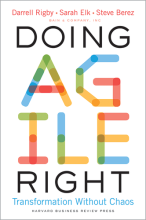
By Darrell K. Rigby, Sarah Elk, and Steve Berez
Book description (via HBR): "Agile has the power to transform work – but only if it’s implemented the right way. For decades business leaders have been painfully aware of a huge chasm: They aspire to create nimble, flexible enterprises. But their day-to-day reality is silos, sluggish processes, and stalled innovation. The authors break down how agile really works, show what not to do, and explain the crucial importance of scaling agile properly in order to reap its full benefit."
[ Learn the non-negotiable skills, technologies, and processes CIOs are leaning on to build resilience and agility in this HBR Analytic Services report: Pillars of resilient digital transformation: How CIOs are driving organizational agility. ]
Why you should read it: CIOs aiming to sustain high agility in their organizations will discover in this read that balance is key. You’ll learn about the myths and misconceptions that have accompanied agile’s rise to prominence. Discover the potential to transform your company and catapult to the head of the pack when you read this book.
3. Everyday Chaos: Technology, Complexity, and How We’re Thriving in a New World of Possibility
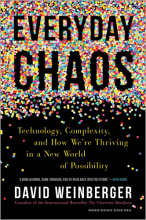
By David Weinberger
Book description (via HBR): "Artificial intelligence, big data, modern science, and the internet are all revealing a fundamental truth: The world is vastly more complex and unpredictable than we’ve allowed ourselves to see. Now that technology is enabling us to take advantage of all the chaos it’s revealing, our understanding of how things happen is changing – and with it our deepest strategies for predicting, preparing for, and managing our world."
Why you should read it: IT professionals looking for inspiration to create possibilities versus simply participating via current tools will find this imperative reading. Being faced with uncertainty and accepting that we know very little allows organizations to confront the vastness of computer generated learning. This book can help leaders find opportunities in the chaos.
4. Technology & Society: Second Edition
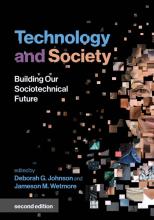
Edited by Deborah G. Johnson and Jameson M. Wetmore
Book description (via MIT): "Writings by thinkers ranging from Rokeya Sakhawat Hossain to Bruno Latour that focus on the interconnections of technology, society, and values. Technological change does not happen in a vacuum; decisions about which technologies to develop, fund, market, and use engage ideas about values as well as calculations of costs and benefits. In order to influence the development of technology for the better, we must first understand how technology and society are inextricably bound together. Many of the texts illustrate how race and gender are intertwined with technology."
Why you should read it: IT leaders who read this book can examine how people shape technology and how technology shapes people, with visions of the future that range from technological utopias to cautionary tales. Gary Lee Downey, Alumni Distinguished Professor of Science and Technology Studies at Virginia Tech says, "Technologies infuse our lives even as they are always filled with our values. This carefully crafted collection helps readers to analyze and reflect critically on our own relationships with technologies, recognizing them as having both technical and social contents. What do you want your relationships with technologies to be? Which values? Which technologies? Dive into this book to figure out how you and your technologies might travel better together.”
5. Women of Color in Tech: A Blueprint for Inspiring and Mentoring the Next Generation of Technology Innovators
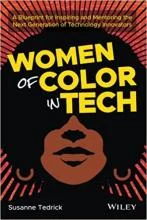
By Susanne Tedrick
Book description (via Amazon): "Women of Color in Tech: A Blueprint for Inspiring and Mentoring the Next Generation of Technology Innovators seeks to help women of color overcome the obstacles that prevent them from pursuing and staying in tech careers. Contrary to popular belief, tech careers are diverse and fun – and they go far beyond just coding. This book will show you that today’s tech careers are incredibly dynamic, and you’ll learn how your soft skills – communication, public speaking, networking – can help you succeed in tech."
Why you should read it: CIOs and IT leaders should be cultivating strong relationships and building networks with young women of color to support and encourage their tech careers. This book offers practical advice and inspiring stories to help develop the right mindset to nurture women of color and help them take their careers to the next level.
6. Kubernetes Security and Observability
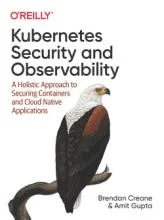
By Brendan Creane, Amit Gupta
Book description (via O’Reilly): "Securing, observing, and troubleshooting containerized workloads on Kubernetes can be daunting. It requires a range of considerations, from infrastructure choices and cluster configuration to deployment controls and runtime and network security. Whether you’re already working on cloud-native applications or are in the process of migrating to its architecture, this guide introduces key security and observability concepts and best practices to help you unleash the power of cloud-native applications."
Why you should read it: In this book, IT leaders will be introduced to key security and observability concepts and best practices to help unleash the power of cloud-native applications and explore the technology choices available to support their organizations. You'll gain practical advice on how to adopt a holistic security and observability strategy for building and securing cloud-native applications running on Kubernetes.
[ Want to learn more about building and deploying Kubernetes Operators? Get the free O'Reilly eBooks: Kubernetes Operators: Automating the Container Orchestration Platform and Kubernetes patterns for designing cloud-native apps. ]
7. Communicating with Data
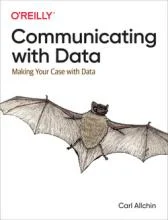
By Carl Allchin
Book description (via O’Reilly): "Data is a fantastic raw resource for powering change in an organization, but all too often the people working in those organizations don’t have the necessary skills to communicate with data effectively. With this practical book, subject matter experts will learn ways to develop strong, persuasive points when presenting data to different groups in their organizations. Once both your business and data experts possess the skills to work with data and interpret its significance, you can deal with questions and challenges in departments across your organization."
Why you should read it: CIOs and IT professionals can get advice on how to find data sources and develop data analytics. More advanced data experts will learn how to visualize data to convey findings to key business leaders more effectively.
8. The Economics of Data, Analytics, and Digital Transformation: The theorems, laws, and empowerments to guide your organization’s digital transformation
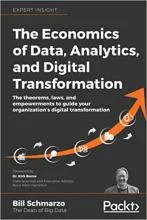
By Bill Schmarzo
Book description (via Amazon): "Build a continuously learning and adapting organization that can extract increasing levels of business, customer, and operational value from the amalgamation of data and advanced analytics such as AI and Machine Learning. The book will help you accelerate and optimize your company’s operations through AI and machine learning. By the end of the book, you will have the tools and techniques to drive your organization’s digital transformation."
Why you should read it: IT leaders working on understanding the economics of Data, Analytics, and Digital Transformation will find actionable insights for their organizations. One reviewer said, "This is the best treatment of the subject matter I have read so far. Firstly, [Bill's] general economic principles and 'laws' can be tailored to your organizational context. Secondly, he shows the vital connection between data, insight and transformation: in effect, establishing the digital basis for the closed loop of business analytics and business growth. A great book for anyone in the organization, including and especially senior management, to understand the economic rationale and drivers behind today's focus on transformative IT."
9. Everybody wants to rule the world
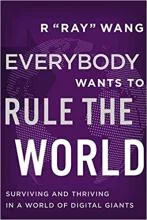
by R. “Ray” Wang
Book description (via Amazon): "Drawing on considerable original research and case studies from Wang’s acclaimed firm, Constellation Research, this groundbreaking guide reveals which kinds of companies will thrive and which will get crushed by the powerful forces now at work. Ultimately, you will understand how the business world is changing in the face of extreme competition, and, most importantly, you will learn how to adapt now to stay relevant and in demand."
Why you should read it: City of Asheville, N.C. CIO and Frost & Sullivan CIO Impact Award winner Jonathan Feldman recommends this book for CIOs and IT leaders because, “It lays out a foundation of how to survive and thrive in the new economy ruled by tech giants – even though the tech giants appear to have the upper hand.” Leaders looking to adapt and change their businesses to thrive among digital giants will gain an understanding of what's needed to stay on top.
10. Beyond Digital: How Great Leaders Transform Their Organizations and Shape the Future

by Paul Leinwand and Mahadeva Matt Mani
Book description (via HBR): "Two world-renowned strategists detail the seven leadership imperatives for transforming companies in the new digital era. Digital transformation is critical. But winning in today’s world requires more than digitization. It requires understanding that the nature of competitive advantage has shifted – and that being digital is not enough."
Why you should read it: IT leaders and CIOs looking to identify solid leadership tips for the evolving digital age can take inspiration from the book to define a bolder purpose and transform their organizations.
[ Where is your team's digital transformation work stalling? Get the eBook: What's slowing down your Digital Transformation? 8 questions to ask. ]



